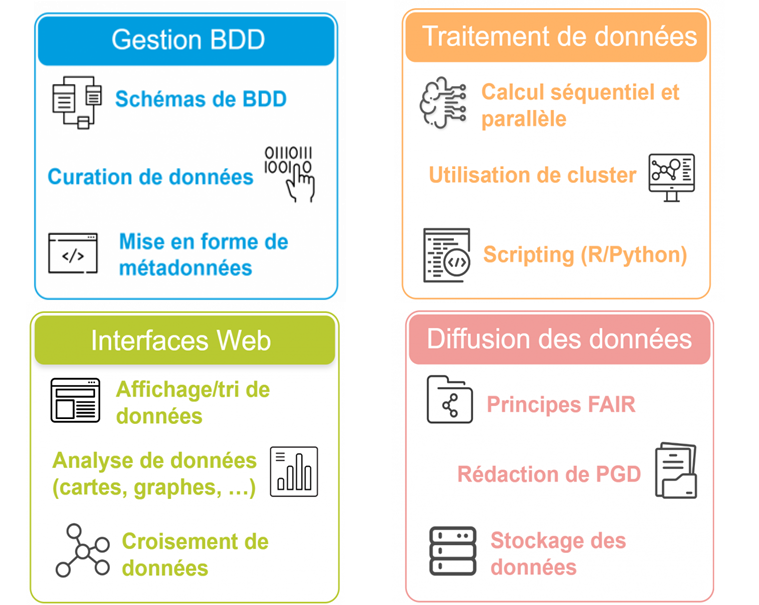L’IMBE
A research unit dedicated to the study of Biodiversity and Ecology
MBE is a Joint Research Unit bringing together two universities (Aix Marseille Univ. and Avignon Univ.) and two research institutes (CNRS and IRD). This Unit carries out integrative research, developing global and interdisciplinary approaches to the study of biodiversity and ecology. This research is taking place in a global context of threats to biodiversity and global changes ecosystems as a result of human activity.
The IMBE has more than 260 members.They work in a variety of complementary scientific and technical fields: ecology, biology, chemistry, medical or pharmaceutical sciences, social sciences at close relationship with the company (managers of natural areas and resources, decision-makers, NGOs, companies....).
IMBE is interested in marine and continental systems and their interfaces in a variety of biogeographical contexts (zone Mediterranean, arid, mountain and tropical regions in particular), and at different levels of life organisation (from the molecule to the ecosystem). The organisation and functioning of biodiversity and ecosystems, their historical and evolutionary dynamics, their vulnerability, their conservation and their restoration as well as the effects of their degradation on human health are at the heart of our interdisciplinary research and our various training initiatives.
The IMBE is positioned at six major sites in metropolitan France (Marseille : campus Etoile - St-Jérôme, Endoume marine station, the Timone ; Aix-en -Provence : Arbois ; Avignon : Agroparc ; St-Michel Observatory : Haute Provence Observatory) and two ultra-marine sites (Martinique : Caribbean Agro-Environmental Campus ; Senegal : Dakar).
An organisation with several interlocking levels
- The collectives : the fundamental level of the IMBE organisation
Each member of the Unit is attached to a group, which may be either scientific (one of the 8 research teams), or technical (one of the 5 technical centres/8 shared services). These groups are the entities within which the IMBE's scientific and technical activities are carried out.
- The thematic areasIMBE's scientific and technical cross-disciplinary level
The members of the Unit's teams interact within five thematic areas (biodiversity, ecosystem functioning, global change, unique health, socio-ecological co-viability) which enable them to decompartmentalising the disciplinary activities of groups.
- The cells and committees : cross-functional level of support for IMBE
The cells and committees deal with issues indirectly linked to the Unit's scientific and technical activitiesThese include issues such as health and safety, ecological transition and employee support. Our organisation also includes site committees to deal with specific issues relating to the five major metropolitan sites of Marseille, Aix-en-Provence and Avignon.
- The boards and committees : the level of governance and management of the IMBE
The executive committee (CODIR) coordinates the general operation of the Unit, at administrative, strategic and functional levels.
It is based on the unit council (CU), which gives its opinion on the institutional life of the Unit and on the steering committee (COPIL), which represents the Unit's teams and helps to manage human, scientific and technical resources.
Le scientific advisory board (CS) coordinates the Unit's scientific activities and is involved in foresight and scientific and technical expertise.
A little history
IMBE was born of the concrete and coherent grouping of skills for an integrative approach to ecology.
- in 2012, the Institut méditerranéen d'écologie et de paléoécologie (UMR 6116 IMEP, CNRS - IRD - Université Paul Cézanne - Université de Provence), which focuses on continental environments, and the Diversité, évolution et écologie fonctionnelle marine (UMR 6540 DIMAR, CNRS - Université de la Méditerranée), which focuses on marine environments, were merged.
- From the outset, this founding association was strengthened by the integration of a team exploring the relationship between the environment and health (EA 1784 "Biogenotoxicology and environmental mutagenesis").
- At the end of 2016, the Laboratoire d'Instrumentation et Sciences Analytiques (LISA, EA 4672) joined IMBE.
- In 2018, the pharmacognosy team from UMR MD3 (Host-Parasite-Pharmacology and Therapeutics Interactions) strengthened the IMBE's scientific and human potential.
Values that guide our project
Our project is based on a triptych of values and ambitions
- Scientific and technical quality ;
- Human synergies and well-being ;
- Scientific and technical commitment at the service of society.






